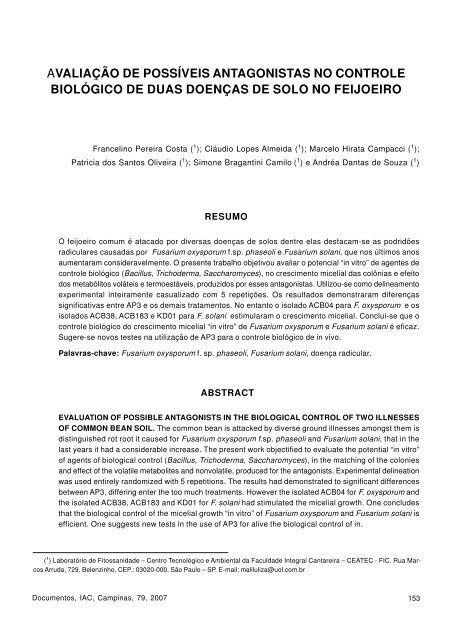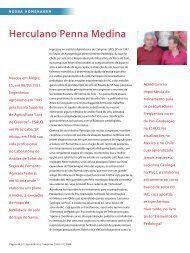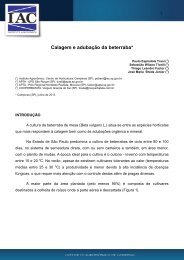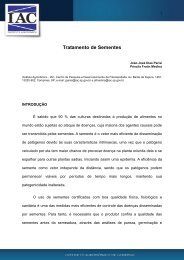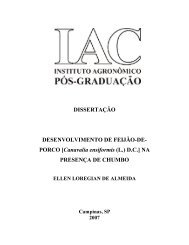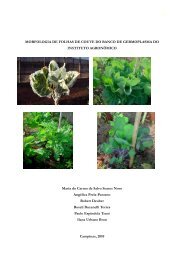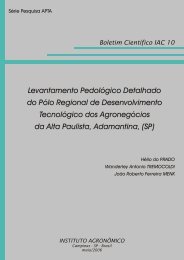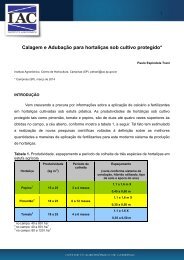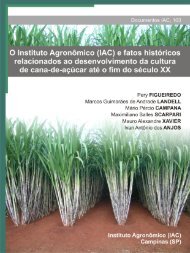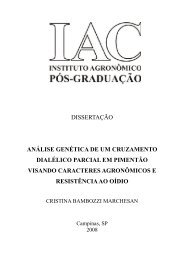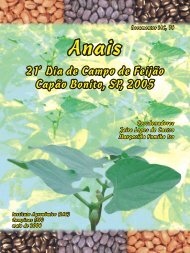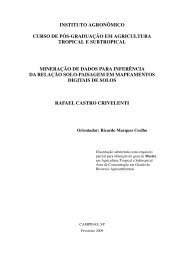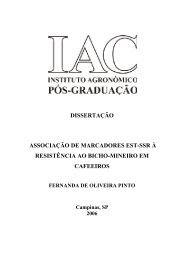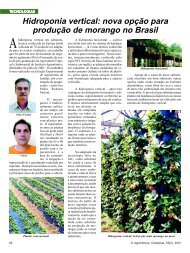vi seminário sobre pragas, doenças e plantas daninhas do ... - IAC
vi seminário sobre pragas, doenças e plantas daninhas do ... - IAC
vi seminário sobre pragas, doenças e plantas daninhas do ... - IAC
- No tags were found...
You also want an ePaper? Increase the reach of your titles
YUMPU automatically turns print PDFs into web optimized ePapers that Google loves.
AVALIAÇÃO DE POSSÍVEIS ANTAGONISTAS NO CONTROLE<br />
BIOLÓGICO DE DUAS DOENÇAS DE SOLO NO FEIJOEIRO<br />
Francelino Pereira Costa ( 1 ); Cláudio Lopes Almeida ( 1 ); Marcelo Hirata Campacci ( 1 );<br />
Patricia <strong>do</strong>s Santos Oliveira ( 1 ); Simone Bragantini Camilo ( 1 ) e Andréa Dantas de Souza ( 1 )<br />
RESUMO<br />
O feijoeiro comum é ataca<strong>do</strong> por diversas <strong>do</strong>enças de solos dentre elas destacam-se as podridões<br />
radiculares causadas por Fusarium oxysporum f.sp. phaseoli e Fusarium solani, que nos últimos anos<br />
aumentaram consideravelmente. O presente trabalho objetivou avaliar o potencial “in <strong>vi</strong>tro” de agentes de<br />
controle biológico (Bacillus, Trichoderma, Saccharomyces), no crescimento micelial das colônias e efeito<br />
<strong>do</strong>s metabólitos voláteis e termoestáveis, produzi<strong>do</strong>s por esses antagonistas. Utilizou-se como delineamento<br />
experimental inteiramente casualiza<strong>do</strong> com 5 repetições. Os resulta<strong>do</strong>s demonstraram diferenças<br />
significativas entre AP3 e os demais tratamentos. No entanto o isola<strong>do</strong> ACB04 para F. oxysporum e os<br />
isola<strong>do</strong>s ACB38, ACB183 e KD01 para F. solani estimularam o crescimento micelial. Conclui-se que o<br />
controle biológico <strong>do</strong> crescimento micelial “in <strong>vi</strong>tro” de Fusarium oxysporum e Fusarium solani é eficaz.<br />
Sugere-se novos testes na utilização de AP3 para o controle biológico de in <strong>vi</strong>vo.<br />
Palavras-chave: Fusarium oxysporum f. sp. phaseoli, Fusarium solani, <strong>do</strong>ença radicular.<br />
ABSTRACT<br />
EVALUATION OF POSSIBLE ANTAGONISTS IN THE BIOLOGICAL CONTROL OF TWO ILLNESSES<br />
OF COMMON BEAN SOIL. The common bean is attacked by diverse ground illnesses amongst them is<br />
distinguished rot root it caused for Fusarium oxysporum f.sp. phaseoli and Fusarium solani, that in the<br />
last years it had a considerable increase. The present work objectified to evaluate the potential “in <strong>vi</strong>tro”<br />
of agents of biological control (Bacillus, Trichoderma, Saccharomyces), in the matching of the colonies<br />
and effect of the volatile metabolites and nonvolatile, produced for the antagonists. Experimental delineation<br />
was used entirely ran<strong>do</strong>mized with 5 repetitions. The results had demonstrated to significant differences<br />
between AP3, differing enter the too much treatments. However the isolated ACB04 for F. oxysporum and<br />
the isolated ACB38, ACB183 and KD01 for F. solani had stimulated the micelial growth. One concludes<br />
that the biological control of the micelial growth “in <strong>vi</strong>tro” of Fusarium oxysporum and Fusarium solani is<br />
efficient. One suggests new tests in the use of AP3 for alive the biological control of in.<br />
( 1 ) Laboratório de Fitossanidade – Centro Tecnológico e Ambiental da Faculdade Integral Cantareira – CEATEC - FIC. Rua Marcos<br />
Arruda, 729, Belenzinho, CEP.: 03020-000, São Paulo – SP. E-mail: maliluliza@uol.com.br<br />
Documentos, <strong>IAC</strong>, Campinas, 79, 2007<br />
153


